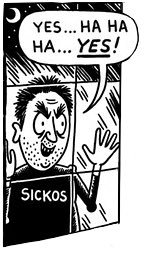Eric Johnston, president of the US Chamber of Commerce and MPAA:
"We'll have no more Grapes of Wrath, we'll have no more Tobacco Roads. We'll have no more films that show the seamy side of American life. We'll have no pictures that deal with labor strikes. We'll have no pictures that deal with the banker as villain."
The boys brought this up in the latest podcast. Not only are there guidelines that work to limit dialog, but institutional controls that make it impossible for people to even bring up topics that threaten capitalism. Freedom of speech *
*conditions way apply
Really? I haven't listened to it yet, that's funny, I was just looking through my research from my dissertation
Yeah it's a good podcast as well. I was thinking about the taboo topics just the other day. I think my favorite is a 'maximum wage' mandate. Never gonna hear that in MSM
"Only savages and Communists get rich by force - that is by looting the property of others"
I skimmed the whole thing and thought that shit sounds like something Ayn Rand would write.
Oh yeah I forgot it doesn't say who wrote it anywhere. Pretty funny that they approached her for this tbh. I have a theory that she constructed her whole philosophy to justify leaving her family in Russia after they paid for her to leave (not that it was bad to be in Russia but I'm pretty sure she was supposed to raise money so they could join her)
But but but Guys, culture is not a ~material issue~. What media people consume is not ~doing politics~. Art is not praxis, unless it involves donating money to my/my friend's charity project!
Gotcha. I know the big studios do this (everything is filled with military propaganda) and like, nearly all American TV shows have FBI shit in them. I swear that's because you need to get their permission and allow them to edit the episodes.
But if a small-time creator makes an indie show/film, then they can be as critical as they want, which makes it better than a complete ban (which is censorship). Like, obviously what the US does is wrong and for propaganda, but I think there's a difference between the two.
But if a small-time creator makes an indie show/film, then they can be as critical as they want, which makes it better than a complete ban (which is censorship).
Arguably our system is far worse. Direct censorship is a crude tool that rarely works. The USSR had a huge underground network of banned media. Banning something makes it titillating and people seek it out.
In Capitalist society, sure the indie film gets made, but how do you distribute it? How do you advertise it? Propaganda is not that effective if you're just preaching to the choir. Sure, go ahead and make your awesome indie flick that's anti-Capitalist and totally revolutionary. Good luck convincing anyone to see it, or handling media hit jobs to dismiss it.
Fyi, this is pretty much the MO of modern US government, ramped up to extreme. Why would the neoliberal state ban you and look bad, when they could just ignore you and make you look like a fringe weirdo?
Yeah, I think that applies to nearly everything the neoliberal West does. Brave New World rather than 1984.*
*I haven't read either, but this is the comparison I'd seen somewhere else. Fwiw, I did read the novel that inspired them both. We by Yevgeny Zamyatin. Highly recommended.
1984 gets thrown around as the "harsh, totalitarian nightmare state", but I'd actually argue it's not. Only the Party members, basically the PMCs and above, live under totalitarian rule. The way that the life of the "proles" is described in 1984 is more like how people talk about BNW - endless trite distractions and petty bullshit, with the occasional random attacks to keep people confused.
And if you didn't follow the guidelines, your movie just didnt get approved and/or you got purged from society at a show trial performed by the regime.
check out the book National Security Cinema
https://www.goodreads.com/book/show/35521540-national-security-cinema



